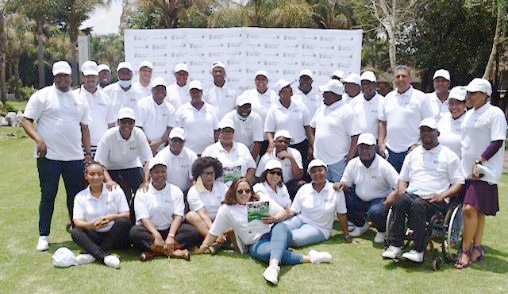With more than 1 million employees, the South African government is the country’s single-largest employer. Public officials, both elected and appointed, play a critical role in the efficiency of the state, their competence directly affecting the governance and functioning of institutions.
Since its transition to democracy in 1994, South Africa’s governance and administrative systems have gradually incorporated modernized models of service delivery. The South African National Developmental Plan (NDP), which serves as the country’s development roadmap, envisions a transformative role for the state and sees the public sector as the essential engine for development. But the discrepancy between these aspirations and the reality of generally poor public service delivery remains stark.
There are numerous reasons for the disconnect, including outmoded practices in human resource management and development, and a lack of capacity among managers and support staff. The government provided no systematic evaluation of successes and failures, little standardisation, and no needs assessment. Training was too often outsourced to ill-equipped vendors.
It was against this backdrop that the National School of Government (NSG) was launched in 2013 to “Empower public servants to be responsive to citizen needs and government priorities, through education, training, and development interventions.” Since 2019, DAI has been working through the European Union-funded Technical Expertise and Implementation Support Services for the NSG project to advance this goal.

Determining a Baseline
The project team was tasked to deliver three interlinked objectives: 1) Enable the school to operate more efficiently, 2) Support the rollout of training programmes, and 3) Strengthen the position of the NSG within strategic networks and partnerships.
The project kicked off during a period of intense reflection and planning regarding the future of the NSG. Government leaders were keen for the NSG to take on an expanded mandate, including capacity building for the wider public sector, local authorities, and public enterprises. DAI helped revamp the school’s strategic plan, design a new organizational structure, and conduct a skills audit of NSG staff. “The resulting staff profiles database is proving particularly useful right now,” said Team Leader Robert Taylor, as the NSG assigns individuals to new roles in its new structure.
In addition to this, the project helped develop a wide range of discussion papers and presentations, focusing on business indicators, new funding models, and long-term repositioning.
“All of [these efforts were] about developing the strategic orientation of the school,” said Taylor. “We then started building some of the plans and support systems, including a Quality Management System, and supported the development of the school’s Digital Transformation Strategy and Plan.”
The school’s new strategic orientation adopts an overall delivery model for the NSG that establishes clear quality indicators for NSG operations and activities, and incorporates direct guidance on delivery modalities, with a strong emphasis on partnerships with higher education institutions nationally and a range of international partnerships.
“A central feature of our recommendations is the imperative to shift toward online training,” said Salim Latib, a training expert who led a review of the school’s delivery model. The team helped build the NSG’s capacity for digital delivery and provided curriculum development and research.
Rolling Out Training, Despite COVID-19
The team also supported the rollout of the training programmes themselves, including a course called “Breaking Barriers to Entry into Public Service,” designed to prepare graduates for public service careers; a compulsory induction programme for new entrants to public service; a youth orientation programme; and a reorientation programme to instil new institutional values for public servants employed before 2012.
Midway through this training support, COVID-19 struck and sessions could no longer be conducted in person. “But the pandemic, ironically, pushed the school to move more forcefully and significantly into the digital realm,” Taylor said. “A lot had to be done online, and on the few occasions when we could gather people, we had to put strict protocols in place.” Nevertheless, the project trained almost 7,000 people through four training programmes over the past two years.
The project’s direct training support culminated in a training-of-trainer initiative in late 2021. This initiative was primarily directed at preparing the NSG and trainers across the government to deliver the newly crafted youth programme. Attracting talented young people into the public sector is a particular priority for the South African government.
“The European Union support has been central to achieving positive results in our cadet and youth development programmes,” said NSG Director of Cadet and Youth Development, Ephraim Mmekoa. “In addition to assisting with the delivery of the training initiatives across the country, the technical support provided has been significant in ensuring that we now have a longer-term and more sustainable initiative that specifically targets young new entrants into Public Service. We are hopeful that the support will continue as we move towards a higher level of delivery and ensure that our efforts remain central towards enhancing the NSG’s ability to contribute towards improving state capacity for delivery in South Africa.”

Raising the Profile
To raise the NSG’s relatively low profile, the project team assisted NSG in implementing a branding and partnership strategy that involved developing new relationships with higher educational institutions and signing 10 partnership arrangements with universities across the world—ensuring that the NSG can deliver on the scale required.
“The branding is vital as the NSG has to compete with private providers in the capacity building space and does not have a monopoly in capacity efforts,” said Taylor.
With the support of our team, the NSG is now better known, better connected, and better equipped to deliver on the more ambitious mandate its government has assigned it. As DAI Project Director Stoyan Georgiev put it, “Our intervention strengthened the NSG as a training institution, successfully rolling out three important training programmes, and strengthened the network and collaborations of the NSG in an effort to create new opportunities for the school and its beneficiaries.”
We look forward to celebrating the contributions of South Africa’s empowered civil servants as they continue to advance the cause of sustainable development.
Olivia Govik was a DAI Communications Officer.







